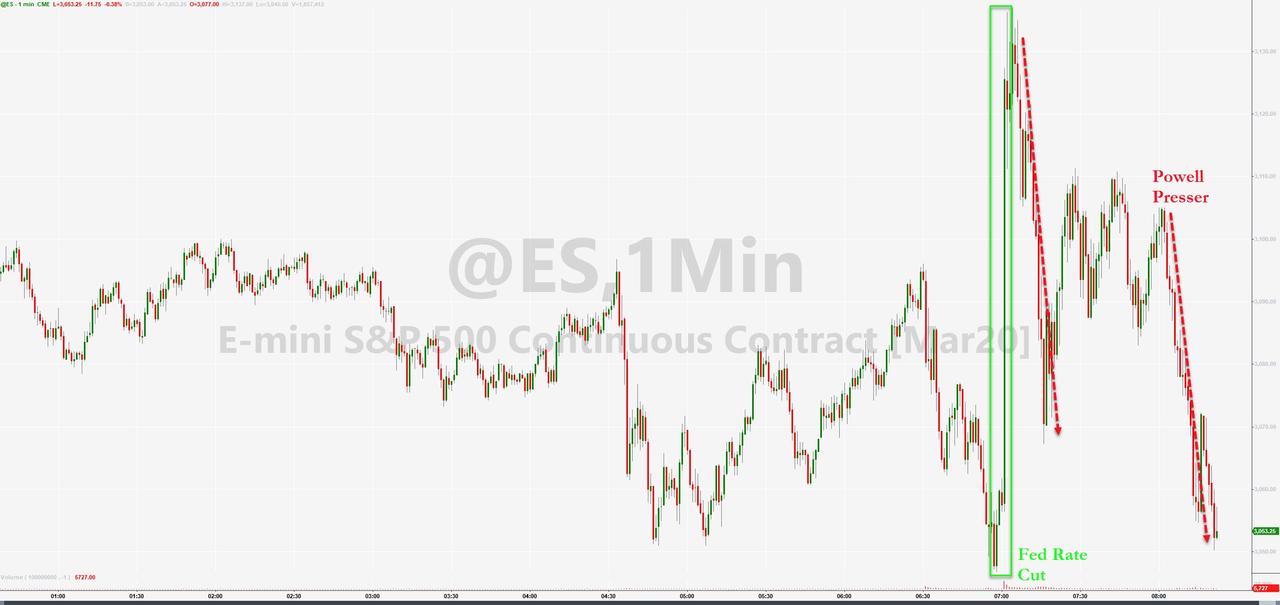The market seems disappointed. After The Fed's 50bps rate-cut sent stocks spiking higher, all those gains have been erased...

But the market (and trump) was asking for more and Wall Street does not seem impressed... as the market's dependence in Fed largesse is revealed for all to see...
Matt Maley, an equity strategist at Miller Tabak & Co:
"This should be very positive on a near-term basis. If the coronavirus causes the market to roll-back over in the coming weeks (which will confirm that the Fed cannot fight a health-care crisis), it's going to mean that we're headed for a bear market. However, this should be quite positive over the near-term."
John Augustine, chief investment officer at Huntington Private Bank:
"The Fed responded proactively to the markets, which is very unusual and may be prelude to them also reacting at their scheduled meeting in March. Other central banks are going to respond in the interim," he said.
"The market is not sure how to respond -- the markets worry with intra-meeting Fed rate cuts, what does the Fed know that we don't know? The stock market will remain volatile until coronavirus cases peak. So at this point in time, we'd say patience. We're in unprecedented territory for the Fed to act like this. This is likely going to lead to further volatility in financial markets."
Max Gokhman, the head of asset allocation for Pacific Life Fund Advisors:
"That central bank response I was talking about over the weekend is coming in quicker and hotter than anticipated. The Fed going for an emergency 50bp cut is a bit too much. It may send the message that the risk to the economy is even bigger than currently anticipated, it leaves them with less ammunition for the rest of the year (unless we go negative under Powell), and it makes them appear to be doing the Administration's bidding since it was widely reported that Mnuchin and Kudlow were pushing for a 50bp cut immediately."
Naufal Sanaullah, chief macro strategist at EIA All Weather Alpha Partners:
"The rates market was looking for 50bps of cuts by April. Equities first found their footing when Powell said he would act as appropriate, and then when G-7 announced an emergency conference call. Now that we've gotten an inter-meeting 50bps cut and the market has rebounded strongly off the lows, the upside is now relatively capped. We expect a wide, volatile range to be carved out over the next few weeks, as we consolidate the big sell-off and digest the incoming newsflow, which has the potential to deteriorate as testing proliferates further."
Neil Dutta, head of U.S. Economics at Renaissance Macro Research:
"Markets are said to stop panicking when policy makers begin to panic. The Fed just delivered an emergency cut, which qualifies as panic. But the Fed's tools are imperfect and not adequate to deal with a public health crisis. The market wants to know how far the virus will spread and the Fed cannot answer that question. The panic needs to come from the opposite of 17th Street in DC."
Win Thin, global head of currency strategy at Brown Brothers Harriman:
"I'll say it again, the optics are bad after Trump just called for a big rate cut. Call me old-fashioned but I guess I'd like a central bank that doesn't hit the panic button every time the stock market freaks out. I know many were calling for this but I am shocked."
We give the last word to former Dallas Fed President Richard Fisher, who warned last week...
"Does The Fed really want to have a put every time the market gets nervous? ...Coming off all-time highs, does it make sense for The Fed to bail the markets out every single time... creating a trap?"
"The Fed has created this dependency and there's an entire generation of money-managers who weren't around in '74, '87, the end of the '90s, anbd even 2007-2009.. and have only seen a one-way street... of course they're nervous."
"The question is - do you want to feed that hunger? Keep applying that opioid of cheap and abundant money?"
the market is dependent on Fed largesse... and we made it that way...
...but we have to consider, through a statement rather than an action, that we must wean the market off its dependency on a Fed put."
Commenti
Posta un commento